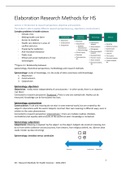Elaboration Research Methods for HS
Lecture 1: Introduction to research perspectives, objectives and questions
The student is able to explain different research perspectives (e.g., objectivism, constructivism)
Complex problems in health sciences
- Climate crisis
- Making health care fairer
- Access to medicine
- Health care delivery in areas of
conflict and crisis
- Preparing for epidemics
- Anti-microbial resistance
- Public trust
- Ethical and social implications of new
technologies
**Figure 2.2. Relationship between
epistemology, theoretical perspectives, methodology and research methods.
Epistemology= study of knowledge, it is the study of what constitutes valid knowledge
1. Objectivism
2. Constructivism
3. Subjectivism
Epistemology: objectivism
Objectivism: reality exists independently of consciousness – in other words, there is an objective
‘out there’.
Connected to research perspective ‘Positivism’: There is only one reality/truth. Reality can be
measured. Knowledge can be formulated into laws.
Epistemology: constructivism
Constructivism: Truth and meaning do not exist in some external world, but are created by the
subject’s interactions with the world. Subjects construct their own meaning in different ways, even in
relation to the same phenomenon.
Connected to research perspective ‘interpretivism ’: there are multiple realities. Multiple,
contradictory but equally valid accounts of the world can exist. Knowledge is contextual.
Epistemology: subjectivism
Subjectivism: Meaning is imposed by the subject on the object. Subjects do construct meaning, but
do so from within collective unconsciousness, from dreams, from religious beliefs, etc. (Binnen deze
studie minder op deze stroming)
Epistemology: checkbox versus continuüm
1
CB – Research Methods for Health Sciences – 2022-2023
,Why is this important?
Example: rise of Ebola in a community
2
CB – Research Methods for Health Sciences – 2022-2023
,The student is able to explain inductive and deductive reasoning
Inductive and deductive reasoning
Deductive: Theory – Hypothesis – Data collection – Confirmation, rejection, modification
Inductive: Data collection – Analysis patterns e.g. – Hypothesis – Theory
Example deductive approach: definition stigma
Health related stigma = a social process, experiences or anticipated, characterized by exclusion,
rejection, blame, or devaluation that results from experiences, perception or reasonable anticipation
of an adverse social judgment about a person or group
3
CB – Research Methods for Health Sciences – 2022-2023
, Deductive and inductive reasoning: in reality
In sum, deductive and inductive reasoning
The student is able to formulate an objective and research questions
Topic, objective and research questions
4
CB – Research Methods for Health Sciences – 2022-2023





